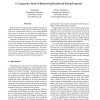Free Online Productivity Tools
i2Speak
i2Symbol
i2OCR
iTex2Img
iWeb2Print
iWeb2Shot
i2Type
iPdf2Split
iPdf2Merge
i2Bopomofo
i2Arabic
i2Style
i2Image
i2PDF
iLatex2Rtf
Sci2ools
102
click to vote
SCAM
2006
IEEE
2006
IEEE
Comparative Study of Refactoring Haskell and Erlang Programs
Refactoring is about changing the design of existing code without changing its behaviour, but with the aim of making code easier to understand, modify, or reuse. Taking Haskell and Erlang as examples, we investigate the application of refactoring techniques to functional programs, and building tools for supporting interactive refactoring. Although both Haskell and Erlang are general-purpose functional programming languages, they have many differences in their language design and programming idioms. As a result, program refactoring in the two languages has much in common, but also considerable differences. This paper makes this comparison, and in particular looks in more detail at the refactorings applicable in each language, the program analysis required by typical refactorings, and at tool support for refactoring Haskell and Erlang programs.
General-purpose Functional Programming | Interactive Refactoring | Refactoring | SCAM 2006 | Software Engineering |
Related Content
| Added | 12 Jun 2010 |
| Updated | 12 Jun 2010 |
| Type | Conference |
| Year | 2006 |
| Where | SCAM |
| Authors | Huiqing Li, Simon Thompson |
Comments (0)

